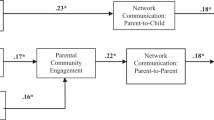Abstract
This paper reports the findings from a study on perceptions of parental role strain as reported by 592 African-American mothers of minoraged children. The research focused on the extent to which utilization of traditional African-American networks would alter role strain reports. The availability of supportive current partners, number of minor children living in the home, availability of relatives in the same state, and residence in the Northeastern section of the United States were each significantly related to the respondents' role strain reports. The author analyzes the findings in terms of their individual, local and national implications for prevention.
Similar content being viewed by others
References
Bernard, J. (1972).The Future of Marriage. New York: World.
Brown, D.R., & Walters, R.W. (1979).Exploring the role of the Black church in the community. Washington, D.C.: Mental Health Research and Development Center, Institute for Urban Affairs and Research, Howard University.
Burr, W.R., Leigh, G.K., Day, R.D., & Constantine, J. (1979). Symbolic interactionism and the family. In Burr, W.R., Hill, R., Nye, R.I. and Reiss, I.L. (Eds.)Contemporary Theories About the Family Vol. II. New York: The Free Press, 42–111.
Cohen, J., & Cohen, P. (1975).Applied Multiple Regression/Correlation Analyses for the Behavioral Sciences. Hillsdale, New York: Lawrence Erlbaum Associates.
Danziger, S., & Plotnick, R. (1981). The receipt and antipoverty effectiveness of cash transfers: Differences among white, nonwhite and Hispanic households. University of Wisconsin-Madison: Institute for Research on Poverty Discussion Paper.
Darity, W.A., Jr., & Myers, S.L., Jr. (1983). The postwar evolution of black family structure: Theories and evidence. Paper presented at the National Economic Association Panel, American Economic Association, December.
Essex, M.J., Klein, H.H., Lohr, M.J. & Benjamin, L.S. (1985). Intimacy and depression in older women.Psychiatry, 48(2 159–178.
Fox, J. (1984)Linear Statistical Models and Related Methods With Applications in Social Research. New York: John Wiley.
Frote, D.A., & Logan, E.W. (1979). Community reactions and appraisals: The extended family as a social core. In D.B. Shimkin, E.M. Shimkin and D.A. Frote (Eds.)The Extended Family in Black Societies. Paris: Mouton Publishers.
Hampton, R.L. (1982) Family life cycle, economic well-being and marital disruption in black families.California Sociologist, 5 (1 1–10
Hatchett, S.J., & Jackson, J.S. (1983). An assessment of black extended kin systems: Data from a national survey of black Americans. Paper presented at Groves Conference on Marriage and the Family, Freeport, Bahamas.
Kamerman, S.B. (1983). Fatherhood and social policy: Some insights from a comparative perspective. In M.E. Lamb, and A. Sagi, (Eds.)Fatherhood and Family Policy. New Jersey: Lawrence Erlbaum Associates.
Kamerman, S.B., & Kahn, A.J. (1981).Child Care, Family Benefits and Working Parents. New York: Columbia University Press.
Kessler, R.C. & Essex, M. (1982). Marital status and depression: The importance of coping resources.Social Forces, 61 (2 474–507.
Lewis, E.A. (1985).Role strain in black women: The efficacy of support network utilization. Doctoral dissertation. Madison: University of Wisconsin-Madison.
Lewis-Beck, M.S. (1979).Applied Regression: An Introduction. Beverly Hills: Sage.
Manns, W. (1981). Support systems of significant others in black families. In H. McAdoo (Ed.)Black Families. Beverly Hills: Sage.
McAdoo, H.P. (1979). Black kinship.Psychology Today, May, 67–110.
McAdoo, H.P. (1980). Black mothers and the extended family support network. In L.F. Rodgers-Rose, (Ed.),The Black Woman. Beverly Hills: Sage.
McAdoo, H.P. (1983). Work roles and coping strategies of employed single Afro-American mothers. Paper presented at the National Council on Family Relations Annual Meeting, St. Paul, MN, October 13.
McAdoo, J.L. (1981). Black father and child interactions. In L.E. Gary, (Ed.),Black Men. Beverly Hills, CA: Sage.
Ogbu, J.V. (1981). Black education: A cultural-ecological perspective. In McAdoo, H. (Ed.)Black Families. Beverly Hills, CA: Sage.
Pearlin, L., & Johnson, J.S. (1977). Marital status, life-strains and depression.American Sociological Review, 42, (5 704–715.
Pearlin, L.I., Lieberman, M.A., Menaghan, E.G., & Mullan, J.T. (1981). The stress process.Journal of Health and Social Behavior, 22 337–356.
Stack, C.B. (1974).All Our Kin. New York: Harper and Row.
Staples, R. (1981). The black American family. pp. 217–244 in C. Mindel and R. Haberstein (Eds.)Ethnic Families in America 2nd Ed. New York: Elsvier.
Taylor, R.J., & Chatters, L.M. (1986). Patterns of informal support to elderly black adults: Family, friends, and church members.Social Work, November/December, 432–438.
Thoits, P.A. (1983). Multiple identities and psychological well being: A reformation and test of the social isolation hypothesis.American Sociological Review, 48 (2 174–187.
Turner, C., & Darity, W.A. (1973). Fears of genocide among black Americans as related to age, sex and region.American Journal of Public Health, 63, (12 1029–1034.
U.S. Department of Commerce, Bureau of the Census (1980).General Characteristics: United States Summary. Washington, D.C.: U.S. Government Printing Office.
U.S. Department of Commerce, Bureau of the Census (1986).We the Black Americans. Washington, D.C.: U.S. Government Printing Office.
Weiss, R.S. (1975).Marital Separation. New York: Basic Books.
Additional information
The Program for Research on Black Americans of the Institute for Social Research at the University of Michigan generously provided data for this study. Gratitude is expressed to Vivian Wood, Rose Gibson and Robert Taylor for their critiques of earlier versions of this work.
Rights and permissions
About this article
Cite this article
Lewis, E.A. Role strengths and strains of African-American mothers. J Primary Prevent 9, 77–91 (1988). https://doi.org/10.1007/BF01326529
Issue Date:
DOI: https://doi.org/10.1007/BF01326529




